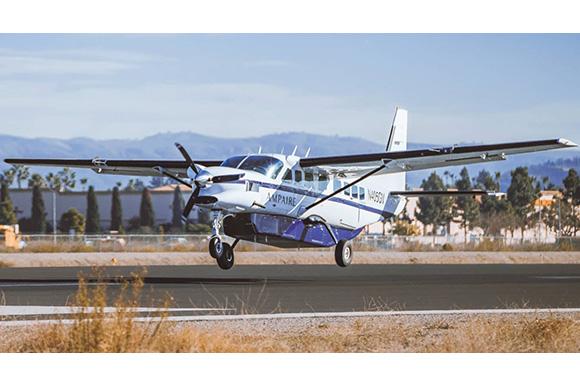
Ampaire is certifying the converted Eco Caravan with its AMP-H570 hybrid-electric powertrain.
It is a workhorse of aviation but, precisely because of its utility and ubiquity, the Cessna Caravan has become the go-to-platform for the initial certification of innovations ranging from autonomous flight to zero-emission propulsion.
More than 3,000 Caravans have been delivered since 1984 and the numbers still in service make the aircraft a lucrative target for upgrades. Retrofits promise to renew the value of depreciated fleets owned by lessors, accelerating deployment of new technologies while paving the way for upgrades to other popular types, including the Beechcraft King Air.
Whether it is battery-electric, hybrid-electric or hydrogen-electric, operators look set to have a choice of sustainable propulsion systems to replace the Caravan’s Pratt & Whitney Canada PT6A turboprop. U.S. startup Ampaire is flying its hybrid-electric Eco Caravan and is targeting certification in 2024.
Australian startup Dovetail Electric Aviation is targeting 2025 for its electric propulsion conversion of the Caravan and U.S. regional operator Surf Air Mobility has a partnership with Textron Aviation to offer electric and hybrid-electric propulsion systems for retrofit and new Caravans beginning in 2026.
The Caravan is also targeted by startup ZeroAvia as the initial retrofit application for its hydrogen fuel-cell powertrain. Certification is planned for 2025. All these startups plan to move on from the single-engine Cessna to popular larger turboprops, Dovetail working on hydrogen fuel-cell propulsion for the King Air.
In addition to reducing or eliminating CO2 emissions, propulsion retrofits could provide other operating benefits to Caravan operators. The electric motor has multiple redundancy and, coupled with redundant battery or fuel-cell energy sources, could enable upgraded Caravans to be certified as multiengine aircraft, potentially easing restrictions imposed on commercial operations with single-turbine aircraft.
Beyond propulsion, several startups are using the Caravan as the platform for the development and deployment of automated flight capability. Merlin Labs, Reliable Robotics and XWing are all working to certify highly automated flight control systems on the popular Cessna turboprop with the goal of improving single-pilot safety and, ultimately, removing the onboard pilot to reduce operating costs.
